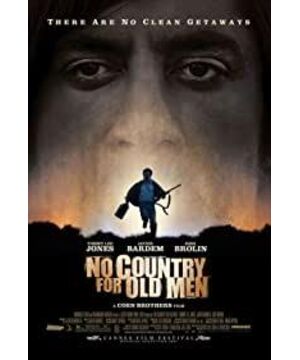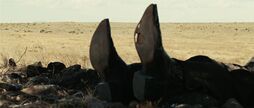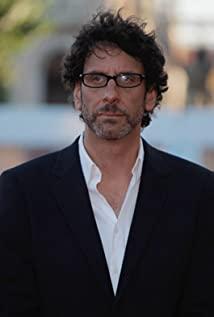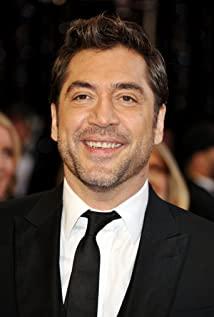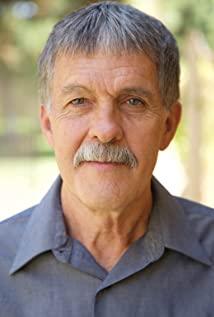"No Country For Oldman", I don't know who translated it into "No Country For Oldman", so that when I knew nothing about this film, I saw it on the Oscar list and won the best picture award and won the Knowing that the film starred Tommy Lee Jones, I thought of seeing the image of Old Tom getting thinner and thinner recently, and I once thought it was a film about social issues in the elderly... (It was a long sentence, I was confused)
Of course , this is indeed a film about "old age" and "society", but it is not the same as the literal meaning. In fact, I personally don't like watching this kind of movies that kill brain cells very much. The busy work has exhausted my brain power recently. Therefore, I would rather come back from overtime at night to watch an episode or two of "Mischief 2 Kiss" or "30" Rock" to relax. But this weekend was sunny and I was in a good mood. Thinking of the May Day not long after, I finally opened this movie that had been lying on my hard drive for months.
"The following 20 words are omitted for spoilers"
That's right, even if I reveal the plot, it's only 20 words, want to know? OK, it doesn't matter if you say it, it's very simple: the story of a perverted killer chasing and killing the person who stole two million drug money. This is what the film is mainly about. However, the film wants to express far more than that, which is why this seemingly B-rated road film is praised to the point of outrageous.
The classification for this film on IMDB is "Crime / Drama / Thriller", which are indeed the three keywords of the film. A confused but experienced and wise policeman, a "principled" but cruel perverted killer, a desperate couple who eat soft but not hard but can't escape doom in the end, and other living beings constitute this thriller (Thriller) Crime (Crime) drama (Drama). If you don't want to spend two hours watching the movie and then spend another four hours reviewing the movie, then stop here, except for the ending, this movie has enough atmosphere to give you excitement. Of course, if you, like me, feel that the obscurity of those details insults your intelligence, then let's discuss it.
The content of this film is a bit messy, and I want to explain it by discussing the worldviews of key characters in sections.
I: Anton Chigurh's worldview
In this film, several main characters have their own worldview, and it is their worldview that makes up the whole story. Anton Chigurh, played by Javier Bardem, is a cruel and ruthless perverted killer. There is only one person who can escape from him - the old man at the gas station. I believe everyone has a deep impression of that dialogue.
Anton Chigurh: You need to call it. I can't call it for you. It wouldn't be fair.
Gas Station Proprietor: I didn't put nothin' up.
Anton Chigurh: Yes, you did. You've been putting it up your whole life you just didn't know it. your life, of course you don't realize it.)
The old man at the gas station got a chance to survive by guessing coins, and he was lucky to get a 50% probability. Chigurh let him go because he had his own principles, but at the same time, the old man was so frightened that he almost pissed his pants.
This shows the killer's worldview. A neurotic perverted killer has no worldview at all. Then he has, or he thinks he has. Therefore, when Mrs. Moss finally met the killer, the killer still took A coin was issued, giving Mrs. Moss 50% of the right to live. However, Mrs Moss said "NO!". The stubborn Mrs. Moss rejected this so-called mercy for survival, saying:
Carla Jean Moss: The coin don't have no say.
Carla Jean Moss: It's just you. It's just you)
The killer tilted his head thoughtfully and said:
Anton Chigurh: Well, I got here the same way the coin did.
In the killer's worldview, the fate of the people he wants to kill is determined by God. The front and back of this coin express the meaning of God, and he himself is only an executor. This so-called fair worldview is actually a cruel sophistry, which is similar to the idea of JIGSAW in the "SAW" series of films. Their seemingly lofty ideas are only closed in their own thoughts. When he asked the old man to guess the coin, the old man said: "I didn't put nothin' up.", but the killer said: "Yes, you did. You've been putting it up your whole life you just didn't know it.", here, all the rules of the game are made by the killer, the old man has no right to choose, he only has "Just call it". The old man chose 50% of the right to live and won it. This kind of grievance and pursuit of perfection inflated the distorted thinking of the killer's extreme self to a certain extent, until he met Mrs. Moss. The words of Mrs. Moss seemed to completely disrupt the killer's world view Now, "The coin don't have no say. It's just you." This choice is actually unfair, we can understand that it's a 50% chance that you have to be killed odds of surviving. The environment of the rules of the game is that you must be killed. The rules of the game are made by the killer. The killer is not an executor, he is a god. This is clearly against the killer's principle. Therefore, it seems as if the struck killer was driving his car absentmindedly after saying "Well, I got here the same way the coin did.", and suddenly... encounters a car accident, which is not so much a punishment from heaven, It's more of a godly sarcasm: "You're a god? Oh, no. You don't have that right."
To understand a film, you must first understand the background of a film. The time of the story in this film is the 1980s. At that time, it was the time when ideas represented by "hippies" were in full swing against traditional ideas. The economic crisis, social unrest and a host of other social problems have created a new generation of young people who are hysterical. This kind of thinking, born in the 1960s, advertised anti-traditional and rebellious, is very consistent with the age and living environment of the professional killer in the film. Under the influence of this kind of hippie thinking, people are decadent, self-conscious, impetuous, and insecure. The so-called individuality and rebellion have been used as excuses and decorations by people. One-night stands, money worship, hypocrisy, and indifference are rampant, and they have become the law of survival and the law of society! Therefore, it is not difficult to understand why the killer killed his boss. The indifferent and cruel way reflects his extreme ego's heart - "That's foolish. You pick the one right tool." (He is a fool, I is the strongest and most suitable tool).
II.
Llewelyn Moss's worldview Regarding the role of Llewelyn Moss, he is repeatedly mentioned in the film as a veteran of the Vietnam War. I believe many people will involuntarily think of Stallone's "First Blood" at this time. This country The victim of consciousness has the same athletic dexterity as Rambo, and the same compassion as Rambo. He can be calm at the murder scene like a mass grave, or he can deliver water to people in the middle of the night. And that part of the escape from the vicious dog, let me vaguely see Schwarzenegger's skills in "True Lie". He can think calmly and carefully, and strike another god-like killer like a god; he refuses to compromise and ends the matter as a tough guy. However, he also has the common personality of the so-called heroes who returned from the Vietnam War on the screen: detached from the society, afraid of facing the society, and afraid of the questioning eyes of the common people after returning to the country. Therefore, the director arranged for him an opening like a lonely hunter, and a kind of isolated home. In the first half, when his Rambo-like body made us hooked, the second half died inexplicably like a tape recorder. This extremely unbalanced shooting method actually reflects more of the psychology of this Vietnam War veteran - brave and fearless on the battlefield, but slow in reality. There is a scene before he dies:
Lady:Hey, Mr. Sportir Goods.
Llewelyn Moss:Hey, yourself.
Lady:You a sport?
Llewelyn Moss:Yeah, that's me. , I am)
Lady: I got beers in my room.
Llewelyn Moss: I'm... I'm waiting on my wife.
Lady :That's who you keep looking out the window for?
Llewelyn Moss: Well, half.
Lady: What else then?
Llewelyn Moss: Just looking for what's comir. Lady
:Yeah. (Hmm)
Lady:But no one ever sees that.
, that's what's going to happen)
Lady:I'll bring the ice chest out.You can stay married.
Llewelyn Moss: No, ma'am, I know what beer leads to.
Lady: Beer leads to more beer.
Through this dialogue, we can see that this veteran with a romantic image is completely embarrassed when facing the hooking up of the opposite sex, and his momentum is completely overwhelmed by the other party. Therefore, he will lose consciousness after that. Qing, was easily killed by several Mexican Ronaldinhos. Therefore, the death of this old man is the most inexplicable.
Of course, this is not inexplicable. This is a character specially arranged and carefully designed by the director. Although it occupies a large part of the scene, it is definitely not the protagonist. This is a role that takes over the sheriff Bell and the killer Chigurh. It will be described in detail below.
Moss' heroism is shown several times in the film, once in a hospital bed:
Llewelyn Moss: Maybe he's the one that needs to be worried... about me. (Maybe he (referring to the killer) is the one who needs to be worried. The...afraid of me)
Carson Wells: He isn't. (He won't)
Once on the phone with the killer:
Yeah, I'm gonna bring you something, all right. Decided to make you a project of mine. (Yes, I'm going to bring you something, I'll make a plan for you.)
Another time on the phone with his wife:
Llewelyn Moss: I'm gonna give you the money, put you on a plane. (I will go over and give you money and take you on the plane)
Carla Jean Moss: Llewelyn, I ain't gonna leave you in the lurch.
Llewelyn Moss: This works better. With you gone and I don't have the money, he can 't touch me, but I can sure touch him. And after I find him, I'll come and join you. I must be able to move him. When I get him, I will come and meet you.)
From then on, we can vaguely see a lone hero planning a careful plan, and a deadly battle is about to break out. However, when we were looking forward to being full, this Vietnam War veteran died before he started, and the death was quite useless. Why? This seems very illogical. However, it is precisely his cowardly death that embodies the metaphor behind it. This is no longer a battlefield, this is a society undergoing qualitative change, and the heroism of the battlefield is no longer applicable. Here, the evil represented by the killer symbolizes the degeneration of society. He wants to defeat this killer by himself, and it is he who declares war on this society. However, the unforgiving reality is that even if he is a hero, he cannot stop the degeneration of this society. This is precisely what differentiates this film from B-movies.
III.Ed Tom Bell's world view
Tommy Lee Jones played Bell is a confused sheriff, which is completely different from his old-fashioned police experience. There is a monologue at the beginning of the film, which is very exciting, and basically points out the main content of the film.
Ed Tom Bell: I was sheriff of this county when I was 25 years old. Hard to believe. My grandfather was a lawman. Father too. Me and him was sheriffs at the same time, him up in Plano and me out here. I think he's pretty proud of that. I know I was. Some of the old-time sheriffs never even wore a gun. Lot of folks find that hard to believe. Jim Scarborough never carried one. That's the younger Jim. Gaston Boykins wouldn't wear one up in Comanche County. I always liked to hear about the old-timers. Never missed a chance to do so. You can't help but compare yourself against the old-timers. Can't help but wonder how they'd have operated these times. There's this boy I sent to the electric chair at Huntsville here a while back. My arrest and my testimony. He killed a 14-year-old girl. Paper said it was a crime of passion,but he told me there wasn't any passion to it. Told me he'd planned to kill somebody for as long as he could remember. Said if they turned him out, he'd do it again. Said he knew he was going to hell. Be there in about 15 minutes. I don't know what to make of that. I sure do don't. The crime you see now, it's hard to even take its measure. It's not that I'm afraid of it. I always knew you had to be willing to die to even do this job. But I don't want to push my chips forward and go out and meet something I don't understand. A man would have to put his soul at hazard. He'd have to say, "OK. I'll be part of this world."Said if they turned him out, he'd do it again. Said he knew he was going to hell. Be there in about 15 minutes. I don't know what to make of that. I sure do don't. The crime you see now, it's hard to even take its measure. It's not that I'm afraid of it. I always knew you had to be willing to die to even do this job. But I don't want to push my chips forward and go out and meet something I don't understand. A man would have to put his soul at hazard. He'd have to say, "OK. I'll be part of this world. "(Too long to translate , Anyone who has seen the movie will understand what it says.)Said if they turned him out, he'd do it again. Said he knew he was going to hell. Be there in about 15 minutes. I don't know what to make of that. I sure do don't. The crime you see now, it's hard to even take its measure. It's not that I'm afraid of it. I always knew you had to be willing to die to even do this job. But I don't want to push my chips forward and go out and meet something I don't understand. A man would have to put his soul at hazard. He'd have to say, "OK. I'll be part of this world. "(Too long to translate , Anyone who has seen the movie will understand what it says.)I always knew you had to be willing to die to even do this job. But I don't want to push my chips forward and go out and meet something I don't understand. A man would have to put his soul at hazard. He'd have to say, "OK. I'll be part of this world."I always knew you had to be willing to die to even do this job. But I don't want to push my chips forward and go out and meet something I don't understand. A man would have to put his soul at hazard. He'd have to say, "OK. I'll be part of this world."
From this monologue, we can get the following information:
1. Sheriff Bell's police career is excellent; 2. Sheriff Bell's ancestors are all police officers, and they are also Bell's idols; Not worthy of carrying a gun; 4. There is a dirty phenomenon in today's society; 5. He will adapt, although he is reluctant.
In fact, the role of Bell is the best understood of all the characters. Since other characters are too obscure, the Coen brothers added too many explanatory lines to the role of Bell, as if they were afraid that the audience would not understand. From a microscopic perspective, although the Bell police are experienced, they cannot understand how this society has fallen into this. From a macro perspective, Bell Police is the representative of "Oldman". Oldman does not specifically refer to the elderly here, but refers to those who hold a traditional world view, and their thinking has been unable to keep up with this society. Their view of the world, right and wrong, runs counter to the development of this society. This society is no longer developing as they imagined. Therefore, the title of this film is "No Country For Oldman". Here I would like to say that the name should be How to translate it, the translation of "nowhere for the old" is obviously inappropriate, and it seems inappropriate to call it "people are not ancient". This is another city sheriff's argument - "a generation is not as good as a generation" (detailed analysis below), and Bell seems to also Not very agree with this statement. Therefore, in my understanding, this should be a cultural conflict unique to an era. In the late 1970s and early 1980s, inflation appeared in the United States, and the arrival of the economic crisis made the young people at that time abandon themselves and believe in a decadent life. They are called As the beat generation, social ideology also appeared abnormal development. So if I'm not mistaken, this should be a movie about hippie culture shocking old society. Therefore, in any case, the charm of the original title cannot be translated. Forget it, let's just call him "No Country for Old Men".
At the end of the film, the director arranged for the Bell police to start narrating two bizarre dreams of his own:
the first dream is relatively simple, saying that Bell lost the money his father gave him. The metaphor here is that he feels ashamed that he didn't carry on the business that his good father left him.
The second dream is about him and his father riding horses in the snow. This is a metaphor for his confusion about the world view. He yearns for the world of his father's era. He regards his father as an idol, and he longs for his father to give guidance in the front. "He was fixir to make a fire somewhere out there in all that dark and cold. And I knew that whenever I got there, he'd be there." woke up.
These two dreams both reflect the confusion of Officer Bell, the confusion about his career, his confusion about life, and his confusion about the society. He is a policeman, but he has not caught the murderer; he is eager to change the society, but he is unable to do so. From this point of view, he and Llewelyn Moss are actually a kind of person.
IV. The world view of the next generation of young people in society
After Moss was injured, he met a group of young people on the road. He spent money to buy one of the young people's jackets. After the transaction, Moss wanted a beer, and the other young man sat on the ground and asked him "" How Much". And Chigurh did the same thing dramatically after he was in a car accident. His first thought was to spend money on a coat, although the two slightly younger children said:
Youth: Well, hell, mister, I 'll give you my shirt. (That's okay, sir, I'll just give you my jacket)
Youth: Hell, mister. Look, I don't mind helping someone out. (Sir, I don't mind helping someone out. of)
Just as we sighed that the child was enlightened, in a blink of an eye, the two of them began to quarrel over the large sum of money. In the same way, the depraved mind has been reflected in the next generation of children. Through the attitudes of these two groups of young people towards money, we can think that what the director wants to express is that under the influence of hippie culture, the younger generation has already produced the idea of worshipping money. From the same way that Moss and Chigurh solve the problem, it can be seen that on this issue, their two life-and-death opponents are not contradictory parties, but a kind of person. In such a social environment, the first reaction people think of to solve problems is through money. Moss managed to evade police by buying a coat and beer and pretending to be an alcoholic, and Chigurh managed to escape. Only practices that conform to the new social ideology can survive.
V. The world view of another city sheriff
After the murder, the sheriff in another area asked Bell to come to his house for coffee. During the dinner, he said something like this:
Constable: You know, if you'd have told me 20 years ago I'd see children walking the streets of our Texas towns with green hair, bones in their noses, I just flat-out wouldn't have believed you. (You know, if you told me on the streets 20 years ago Seeing our Texas kid with dyed green hair and a bone in his nose kills me.)
Bell: Signs and wonders. But I think once you quit hearing "sir" and "ma'am, " the rest is soon to foller. (That said, but I think if one day you don't hear people shouting "sir, ma'am", you'll get used to it soon enough)
Constable:Oh, it's the tide .
Bell: Yeah. Constable: It 's
the dismal tide. It is not the one thing.
The representative of the people is not used to today's young people, thinks that the society is degenerating, and there is no cure for today's children. His point of view is very clear, which is to draw a clear line with the new generation of young people. However, Magistrate Bell has a helpless attitude, which is why he is unhappy all day long, and he is still confused about life at an age. This can be seen in the narration at the beginning of the film.
Ed Tom Bel: lA man would have to put his soul at hazard. He'd have to say, "OK. I'll be part of this world." I will integrate into this world.”)
So we can see that this is not a movie of “no place for the old”, and it does not describe the phenomenon of the elderly society, but describes a conflict between old and new cultures, a kind of conflict between old and new cultures in a specific era. Conflict, in this environment where the hippie culture hits the old view of society, that old view of society has no place. In fact, it is difficult for domestic audiences to understand this film, just as foreign audiences cannot understand my country's wasteful literature on the "Cultural Revolution" theme, history creates culture.
Of course, old and new cultures will always collide. This has nothing to do with sin.
by Brad
2008-4-28
View more about No Country for Old Men reviews


